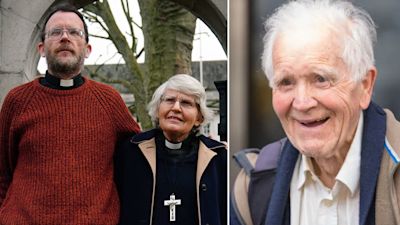XR activists who sat on train roof in 77-minute rush-hour protest cleared by jury

Three Extinction Rebellion activists have been cleared over a 2019 stunt that saw them climb onto the roof of a central London train during the morning rush hour.
Reverend Sue Parfitt, 79, Father Martin Newell, 54, and former Bristol University lecturer Philip Kingston, 85, were unanimously acquitted by a jury at Inner London Crown Court of obstructing the railway following their 77-minute protest at Shadwell Station on October 17 2019.
Kingston, an 85-year-old environmentalist from South Gloucestershire, superglued his hand to a Docklands Light Railway (DLR) train while Parfitt and Newell climbed on the roof and said prayers for the planet, shortly before 7am.
Speaking outside the court on Friday, Parfitt, from Bristol, said she felt the verdict showed the protest had been "the right thing to do".
She said: "It’s wonderful that the jury saw the bigger picture, that the court has vindicated our action, and we hope it in some small way inspires others to feel that there may be sacrifices to be made, perhaps particularly by people of faith.
"We have to do whatever it takes to try our best to enable the people on this earth to change direction radically so that we live differently and we live in a better way.
"We are in an extreme and dire emergency in terms of our civilisation and our human and non-human species on the planet, and we have to have action from the governments of the world."
Newell, who is based in Birmingham, said he is prepared for further action and would risk going to prison in the future.
He said: "I'm not sure that disrupting public transport is the right thing to do at this point, but in terms of would I risk going to prison? Absolutely."
Mike Schwarz, solicitor at the law firm Hodge Jones and Allen which represented the defendants, said: "There is mounting evidence from the courts and in particular from juries that the public is taking the climate crisis and the increasingly urgent need to focus on it far more seriously than government and business. This verdict is part of this escalating pattern."
The trio said they were strongly motivated by their Christian faith, while Kingston said the futures of his four grandchildren also prompted him to take part in the protest.
In what they said was an attempt to appeal to the public and the Government about the dangers of climate change and the financial institutions whose actions damage the planet, they targeted a train which was one stop away from Bank, in the City of London’s financial district.
Some 15 trains were delayed or cancelled but none were stuck in tunnels.
This was partly because, according to the activists, they had planned the demonstration to ensure there was no risk to public safety, by taking measures including targeting a station above ground and having 10 more Extinction Rebellion activists on the platform to ensure violence did not break out.
The verdict comes on the same day Extinction Rebellion protester James Brown had his sentence cut from 12 months to four after supergluing himself to the roof of a plane at London City Airport and six activists who blocked motorways as part a series of protests by the Extinction Rebellion offshoot Insulate Britain were released from prison.
Last year a string of convictions against protesters were overturned at the Old Bailey, where a judge criticised the Crown Prosecution Service for pursuing prosecutions against climate activists.
Judge Mark Dennis QC said the CPS had not grasped the implication of a Supreme Court ruling in June 2021 that quashed the convictions of a group of demonstrators who blockaded a London arms fair in 2017.
He said there was a "fundamental problem" at the CPS over its understanding of the ruling, or the "basic human rights point that has been there for a very long time".